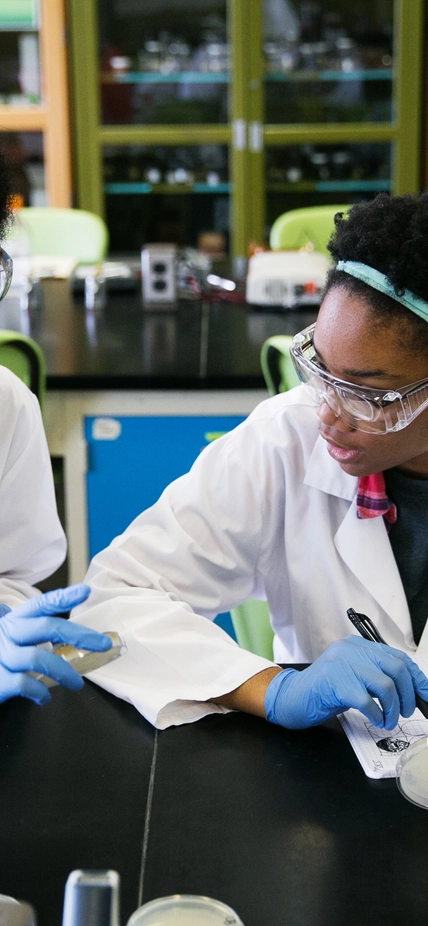The Amgen Foundation, in partnership with Carnegie Academy for Science Education (CASE), announced that it brings the Amgen Biotech Experience (ABE) to local classrooms as part of a $10.5 million investment in the longstanding science education program. Globally, ABE is expected to reach nearly 900,000 high school students by 2020 in 18 regions around the world. Building on program’s success, Amgen and Carnegie Academy for Science Education will engage D.C. high school students with proven hands-on science labs
For nearly 30 years, ABE has empowered high school science teachers to implement real-world biotechnology labs in their classrooms, helping their students better understand science and how it influences their daily lives. The three-week in-class lab initiative provides teacher professional development, teaching materials, and research-grade equipment to classrooms to immerse students in the concepts and techniques scientists use to discover and develop medicines.
“Our partnership with Carnegie Academy for Science Education starts an exciting new chapter for the ABE program throughout the Washington, DC area. Carnegie Academy for Science Education’s leadership and commitment will build upon the program’s proven impact in boosting students’ interest and confidence in doing science and biotechnology,” said Eduardo Cetlin, president, Amgen Foundation. “We are excited to work with Carnegie Academy for Science Education to bring hands-on science education to even more DC area students, educators and communities.”
Results of an independent and rigorous evaluation by WestEd found that ABE students have shown significant and substantial gains in biotechnology learning, as well as increased confidence and interest in doing science and biotechnology. Results show that:
- students had a statistically significant increase of their biotechnology knowledge and skills (p < 0.001);
- students averaged a 20 percent increase between pre- and post-test scores;
- 82 percent of students got new ideas about what happens in science labs;
- 72 percent of students got new ideas about what science is;
- 53 percent of students are more interested in learning about science research; and
- 53 percent of students report increased interest in science careers from ABE participation.
Separately, Change the Equation, a coalition working to improve science, technology, engineering and math (STEM) literacy, distinguished ABE with the highest possible ranking in STEMworks, its database of effective STEM education programs. Business leaders, funders and STEM advocates use STEMworks to find proven, scalable programs to help them maximize their impact on STEM education.
“Graduates of CASE have successfully pursued science-related, and STEM-centered, jobs, utilizing the skills gained through these experiences. We are excited to partner with Amgen Foundation to bring hands-on science into DC classrooms. All of our students deserve the opportunity to experience the quest and thrill of authentic research.” said Marlena L. Jones, Acting Director of CASE and the DC STEM Network.
CASE will receive support as part of the Amgen Foundation’s commitment to engage an additional 300,000 students across 18 markets by 2020. Recently, the Amgen Foundation announced ABE’s expansion to Australia, Canada, China, France, Germany, Hong Kong SAR, Italy, Netherlands and Singapore. The program is already underway in the United States, Puerto Rico, United Kingdom and Ireland.
“Carnegie Science established CASE to give DC students the opportunity to learn science by experiencing authentic scientific research, just as our scientists do all over the world,” said Matthew Scott, President, Carnegie Science. “We are thrilled to have formed this partnership with the Amgen Foundation to expand access to authentic science learning to more DC students.”
The Amgen Foundation's total past and current commitment to ABE now reaches more than $25 million, bringing the Foundation's total commitment to STEM education to more than $125 million globally.
Learn more about ABE by visiting AmgenBiotechExperience.com. To learn more about the Amgen Foundation’s other science education programs, visit AmgenInspires.com.
About the Amgen Foundation
The Amgen Foundation seeks to advance excellence in science education to inspire the next generation of innovators, and invest in strengthening communities where Amgen staff members live and work. To date, the Foundation has donated over $250 million to local, regional, and international nonprofit organizations that impact society in inspiring and innovative ways. The Amgen Foundation brings the excitement of discovery to the scientists of tomorrow through several signature programs, including Amgen Scholars, Amgen Biotech Experience, and Amgen Teach. For more information, visit www.amgeninspires.com and follow us on Twitter @AmgenFoundation.
About CASE and Carnegie Science
The Carnegie Academy for Science Education (CASE), based at Carnegie Science in Washington, D.C., works to improve science, technology, engineering and mathematics (STEM) education for DC students. CASE specializes in developing hands-on, standards-aligned programs that cultivate readiness for college and careers, while engaging student exploration and investigative skills. To enhance student STEM preparation, CASE continues to provide multiple professional learning opportunities for teachers. To increase access to STEM learning for all DC students, CASE has launched the DC STEM Network, a citywide, cross-sector collaboration. For more information, visit www.case.carnegiescience.edu and follow us on Twitter @CASE_Carnegie.
The Carnegie Institution for Science (carnegiescience.edu) is a private, nonprofit organization headquartered in Washington, D.C., with six research departments throughout the U.S. Since its founding in 1902, the Carnegie Institution has been a pioneering force in basic scientific research. Carnegie scientists are leaders in plant biology, developmental biology, astronomy, materials science, global ecology, and Earth and planetary science.
